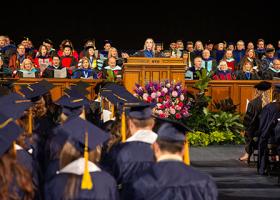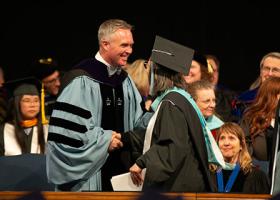Read Time: 5 minutes
The McKay School of Education held its graduation ceremony congratulating all 505 of its graduates, including 172 students graduating in secondary education.
Receiving her bachelor’s in elementary education, Celina Forsyth of Richfield, Utah, shared her thoughts at the close of her undergraduate career. She talked about the very real challenges educators face such as “students eating erasers, crayons, even the bottoms of their own shoes.” She also spoke of large classroom sizes, disrespect, lack of support, and keeping students safe.
Despite these challenges, Forsyth finds one of the biggest challenges educators face is “the challenge of constantly being told how challenging it is.” Educators are reminded almost daily by everyone from parents to passersby of the unique challenges of the job they have chosen.
Even with its difficulties, Forsyth emphasized the fact that each of the graduates chose this career. Some view the career of an educator as a calling while others don’t, but Forsyth emphasized, “whether choosing or chosen, we are capable of handling the challenges we face.”
In fact, Forsyth added one more challenge to the graduates’ plates: to “continue to follow the Master Teacher’s example while also changing the talk that revolves around our careers today.” She admonished these future educators to “let our championing moments shine brighter than our challenges.”
Forsyth wants educators to highlight their wins. To highlight when their student tackles new subjects and learns new skills. She wants to hear stories of hugs and of the care of teachers. She wants to change how educators are seen from “how unlucky are your paychecks” to “how lucky are those kids.”
While there are very real challenges, Forsyth encouraged her fellow graduates: “you are capable, and you were chosen . . . the Savior is on our side.”

Vaega Toilolo is graduating with his master’s degree in educational leadership to become a licensed administrator and was elected as his cohort’s graduate student representative. Originally from Hawai’i, Toilolo received the Calm Room Grant for his International Language Program from the Cook Center for Human Connection.
Toilolo centered his remarks around the many lessons he learned during his time in the McKay School that have prepared him to serve others.
“I have learned that educational leadership requires intentional planning based on a vision and mission of a school,” Toilolo said. Leaders need to be able to understand their vision when making decisions.
Toilolo also shared advice given to him from his mother, “serve, but serve with your heart.” One of the greatest lessons Toilolo learned was that “an effective leader loves those he serves.” With these two pieces of advice, Toilolo encouraged graduates to see their role as leaders and servants as one.
The final and greatest lesson Toilolo learned was that educators are “working with God’s children.” He encouraged graduates to model their teaching after the master teacher and to remember what He taught.

Shane Farnsworth is currently serving as the superintendent of Alpine School District in northern Utah County. He received his bachelor of arts degree in classical studies and his master and doctorate of education degrees in educational leadership from BYU. With twenty-four years of experience in public education, Farnsworth has also chaired the state of Utah School Accreditation Council and served for several years as a lead evaluator of schools.
Farnsworth shared how his faith in the gospel of Jesus Christ has made him whole, both personally and in his work in public education. He said his faith “significantly impacts who I am, my interactions with others and the decisions I make.” Beyond this, Farnsworth exercises his faith in every position he has held, in daily interactions and the decisions that impact those around him.
Farnsworth has found three specific ways his faith has made him whole in his work as an educator. The first is the belief “in God the Eternal Father and that we are all, everyone of us, His children.” He shared his experience as a Junior High principle with a student who kept “misbehaving himself out of a class.” At first, Farnsworth shared how he became frustrated as no action he took worked to change this student’s behavior. However, as he began to know this student, Farnsworth said he “started to see him differently, as a child of God, as my little brother.” Farnsworth understood that the student was feeling overwhelmed in the classroom and seeking a break. He changed his strategy and gave the student a pass to come see him whenever he felt unsettled. In time, the student learned positive coping skills and returned to class. Farnsworth said, “the more I see others as my brothers and sisters, as children of God, the better I exercise moral judgement in responding to them and making decisions that affect them and their well-being.”
The second area of his faith that has made him whole is his belief in “Jesus Christ who is full of grace and truth.” As the world of education is filled with “theories, postulates, principals, pedagogies and research” it can be easy to wonder what is true. The way to a clear decision for Farnsworth is to “seek and embrace educational philosophies and practices that align with eternal truth.” He believes that by doing so, he will be able to respect the “agency of learners.”
Farnsworth explained that the final aspect of faith that makes him whole is the knowledge that he is “not capable of exercising (his) best moral judgement without the guidance, grace and gifts available from my Heavenly Father and His Son Jesus Christ.” Farnsworth emphasized our Heavenly Father’s interest in our work—He provides enabling power to enhance our natural capacities.
Writer: Bridget Quain
Contact: Andrew Devey